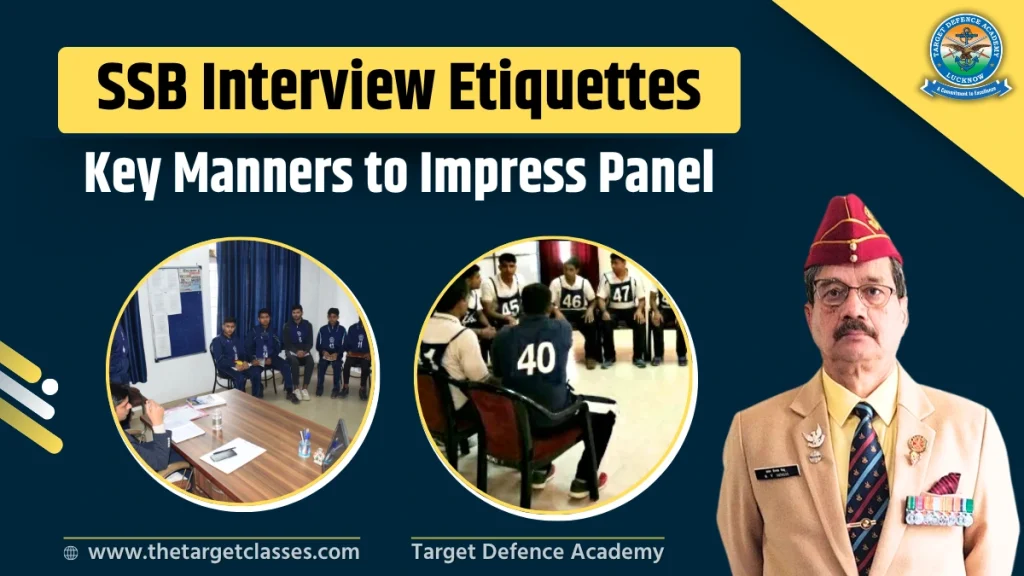In a very competitive SSB interview, technical knowledge will not secure your choice alone. Selection boards consider officers as qualities (OLQs) as faith, discipline and mutual qualifications. One of the most effective ways to express these symptoms is through sophisticated professional etiquettes. These small habits reflect your character and severity, leaving a permanent impression on the evaluer.
Here is an intensive guide on top -tingling, each SSB aspiration must master before entering the selection center.
1. Perfect Presentation and Grooming
- Sharp uniform: Clean, ironed, efficaciously worn, with polished footwear and right rank insignia.
- Neat grooming: Well-trimmed hair and beard, minimal add-ons—signal discipline and interest to detail.
2. Punctuality is Paramount
Arrive as a minimum 15–20 minutes early to keep away from closing-minute stress. Use this extra time to:
- Calm your nerves,
- Review personal notes,
- Exhibit time-consciousness and respect for the process.
3. The Art of First Impressions
- Firm handshake: Stand in a straight position, have a smile and preserve eye contact.
- Greeting: Say “Good morning/afternoon, Sir/Ma’am” really and optimistic.
4. Communication Skills and Respectful Speech
- Clear tone: Speak in a moderate, natural volume—avoid monotony and shouting.
- Humble Language: Change informal terms with respectable sentences- “Yes, mam/sir, please.”
- Answer: Maintain the structure and avoid going outside the topic.

5. Body Language That Speaks Volumes
- Composed gestures: Use natural hand movements.
- Honest attitude: shoulder back, chest open – self -confidence and vigilance of bedrooms.
- Maintain eye contact: Shows honesty. Balance it – not stare, not to avoid.
6. Listening Before Responding
- Active consultation: Let the interviewer quit before it answers.
- No blockage: Avoid cutting questions or talking mid-weather.
- Clarify patently: If it is unclear, you can ask politely: “Sir/mam, can you please repeat it?”
7. Respecting Hierarchy and Authority
- Formal address: Always use “head” or “mam” until specified.
- Etiquette at each stage: Thanks, thanks to employees, GD groups and assistants – small gestures have a major impact.
- Tips to Crack SSB Interview in First Attempt
- Complete 5 Days SSB Interview Process – Everything You Need to Know
- 10 Tips for Better PPDT Story Narration in SSB Interview
- List of Top 5 NDA Coaching in India | Best NDA Coaching in India
8. Exhibit Self-Control and Composure
- Be calm and professional, even if you panic.
- Manage emotions: If a question flushes you, stop, breathe and then answer.
- Composed under pressure: Show leadership and maturity.
9. Integrity: Small Deeds, Big Message
- Honesty cases: You don’t know you don’t know.
- Adopt your errors: If you find something wrong, accept it polite.
- Honestly: Authenticity creates self -confidence with evaluates.
10. Polite Exit Strategies
- When leaving a stage or panel, close confidently:
- Thank them: “Thank you, Sir/Ma’am.”
- Wait for acknowledgement and salute appropriately.
- Exit with the same poise you entered.
Bonus SSB Interview Etiquettes for Group and GTO Tasks
| Situation | Key Etiquette |
| Group Discussion | Don’t dominate; credit others; contribute meaningfully |
| Group Planning Exercise | Listen, propose ideas politely, support team goals |
| Written Tasks | Legible handwriting, proper headings, margin usage |
Conclusion
Mastering etiquette is a strong indicator of your readiness and suitability as an officer. It enhances your Officer-Like Qualities and sets you apart in group dynamics, personal interviews, and task sessions. These small habits embody discipline, respect, and leadership—traits the SSB looks for.
Prepare beyond knowledge—harness the power of professional conduct to reflect your true potential during your SSB interview.
FAQs about SSB Interview Etiquettes
Ans. SSB assessors closely observe your behavior to evaluate Officer-Like Qualities (OLQs), and etiquettes reflect discipline, respect, and social adaptability.
Ans. Arrive on time
Wear neat and formal attire
Greet fellow candidates and officers politely
Maintain calm and composed body language
Ans. Speak clearly and contribute constructively
Listen actively and keep away from interrupting others
Be respectful even in disagreements
Encourage team spirit, not competition
Ans. Knock before entering and greet the officer
Sit only when asked
Maintain eye contact and a assured posture
Avoid slang or casual language
Don’t argue; solution with honesty and readability
Ans. Yes. Use good table treatment, avoid gossip and respect everyone’s location – you are also seen outside the test room.
Ans. Avoid fidgeting or slouching
Maintain a calm facial expression
Nod gently to show attentiveness
Keep your hands steady and gestures minimal
Ans. Definitely. Even with robust performance, loss of discipline or poor manners can improve red flags about leadership suitability.

